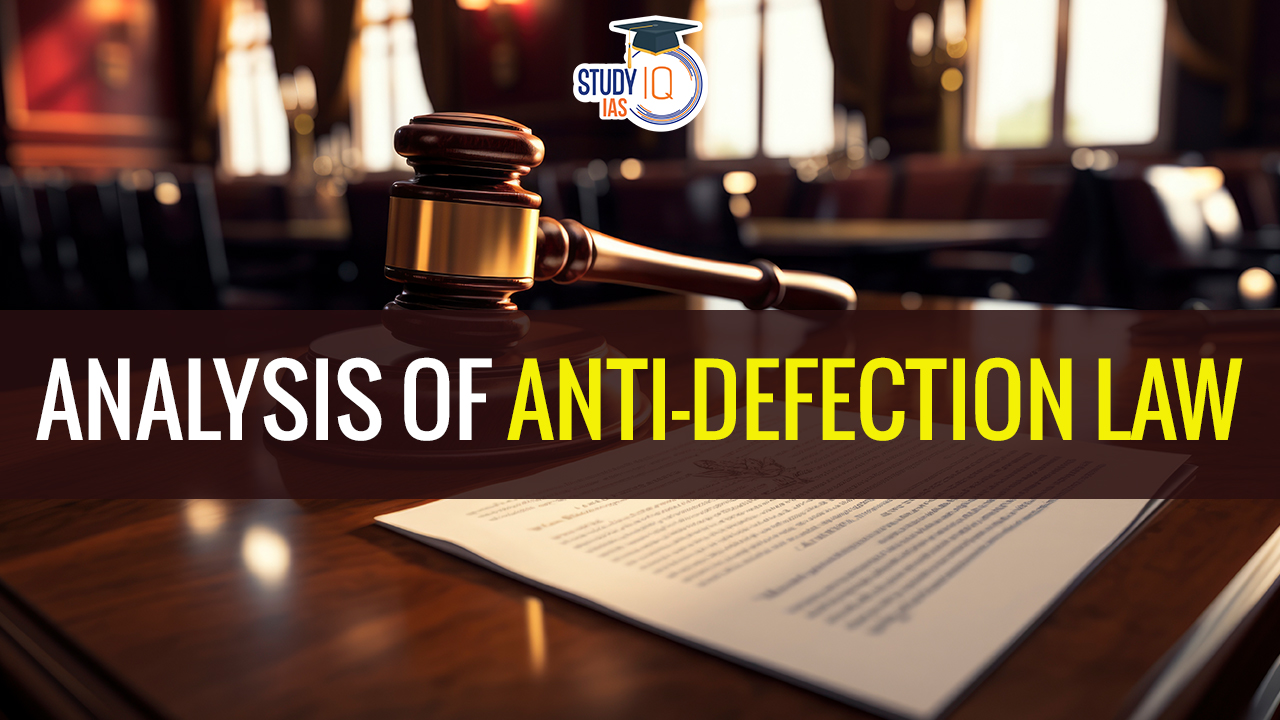Table of Contents
Context: India’s anti-defection law has been unable to fulfil its original objective. Politicians are exploiting loopholes in the act to switch parties without consequences, leading to unstable governments.
Anti-Defection Law: An Overview
- Defection: Defined “To abandon a position or association, often to join an opposing group”. Refers to a situation where a member of a political party gives up his position in the party from which he is elected to join an opposing party.
- Enactment: Implemented through the 52nd Amendment Act of 1985, incorporated into the Tenth Schedule of the Indian Constitution.
- Purpose: Designed to prevent or discourage politicians from switching parties, ensuring accountability to voters and maintaining political party stability and cohesion.
- Penalties for Defection: Anti-defection laws may include penalties such as expulsion from the political party, disqualification from holding public office, or other punitive measures.
We’re now on WhatsApp. Click to Join
Key Aspects of the Anti-Defection Law
- Disqualification: Under Articles 102 and 191, the Tenth Schedule of the Constitution grants the power to disqualify members of Parliament/Members of Legislative Assembly.
- Political Party Members:
- If they voluntarily give their party membership.
- If a member votes or abstains from voting contrary to their party’s directive.
- However, if the member has taken prior permission, or is condoned by the party within 15 days from such voting or abstention, the member shall not be disqualified.
- Independent Members: If they join a political party post-election.
- Nominated Members: If they join a political party six months after their nomination.
- Exceptions:
- Where an entire political party decides to merge with another party.
- The formation of a new party by elected legislators from one party.
- If a member goes out of his party due to a merger of the party with another party.
- Presiding Officer: A member who gives up party membership to become a presiding officer in the house (Speaker in Lok Sabha, Chairman in Rajya Sabha). They can rejoin their party after completing their term, ensuring impartiality in their role.
- Deciding Authority: The presiding officer of the house (Speaker in Lok Sabha, Chairman in Rajya Sabha).
- Rule-Making Power: The presiding officer can formulate rules for implementing the Tenth Schedule. These rules must be presented to the house for 30 days, during which they can be modified or rejected by the house.
- Political Party Members:
Challenges Associated with the Anti-Defection Law
- Delay in Disqualification Decisions: The lack of a specific timeframe for Speakers or Chairpersons to act on disqualification petitions can cause prolonged delays.
- Example: In Manipur, petitions against a Minister and other MLAs remained unaddressed for over two years.
- Use of Resignation to Circumvent Disqualification: Legislators have been known to resign as a strategy to avoid disqualification proceedings.
- While the Supreme Court mandates that Speakers must ensure such resignations are voluntary and genuine, this raises concerns about the use of resignations as a loophole for defection.
- Limiting Legislators’ Freedom of Speech: The requirement for legislators to follow the party whip, particularly in voting scenarios, is criticised for restricting their freedom of expression and autonomy in decision-making within the House.
- Exploitation of Splits and Mergers Provisions: The law allows legislators to evade disqualification by forming new factions with a two-thirds majority, which has led to frequent party shifts.
- Example: This was observed in Uttar Pradesh and Haryana between 1990-2008, where legislators defected, formed new groups, and then merged with other parties, demonstrating the law’s vulnerability to manipulation.
- Formation of Government without Official Party Switch or Merger: In Maharashtra, certain factions within the Shiv Sena and the Nationalist Congress Party successfully formed a government without officially switching parties or merging.
- They claimed to represent the original party and allied with the BJP, exposing a significant gap in the law.
|
Some Other Information Related to Defection |
91st Constitutional Amendment Act 2003
Supreme Court Observation
Global Scenario
|
Way Forward
- Removing the role of the Speaker: Some experts have suggested that the role of the Speaker in deciding on cases of disqualification should be removed and replaced with an independent authority, such as the Election Commission.
- Timely Decisions by the Speaker/Chairperson: The Speaker or Chairperson should adhere to the Supreme Court’s recommendation to resolve disqualification issues within three months. Additionally, establishing an independent tribunal to oversee the Tenth Schedule could minimise the Speaker’s potential bias.
- Reassessment of Merger Clause: Parliament needs to critically assess and deliberate on past recommendations by the Law Commission and the National Commission to Review the Working of the Constitution, which advised removing the merger clause from the law.
- Restricting the Scope of Disqualification: Following the Dinesh Goswami Committee’s Report, disqualification should be limited to cases where a member defies the party whip on critical matters such as the Vote of Confidence, No-confidence Motions, Money Bills, or the Motion of Thanks to the President’s address.
- Fortifying Law’s Intent: It’s crucial to enhance the anti-defection legislation to reflect its original purpose of preserving the integrity and stability of the political landscape. Closing the gaps that facilitate strategic political shifts, as seen in incidents across regions like Uttar Pradesh, Haryana, and Maharashtra, is a priority.


 Somaliland Explained: Location, History,...
Somaliland Explained: Location, History,...
 Signals from the Indian Economy: What Ke...
Signals from the Indian Economy: What Ke...
 Reforms Needed in India’s Political Fu...
Reforms Needed in India’s Political Fu...

























